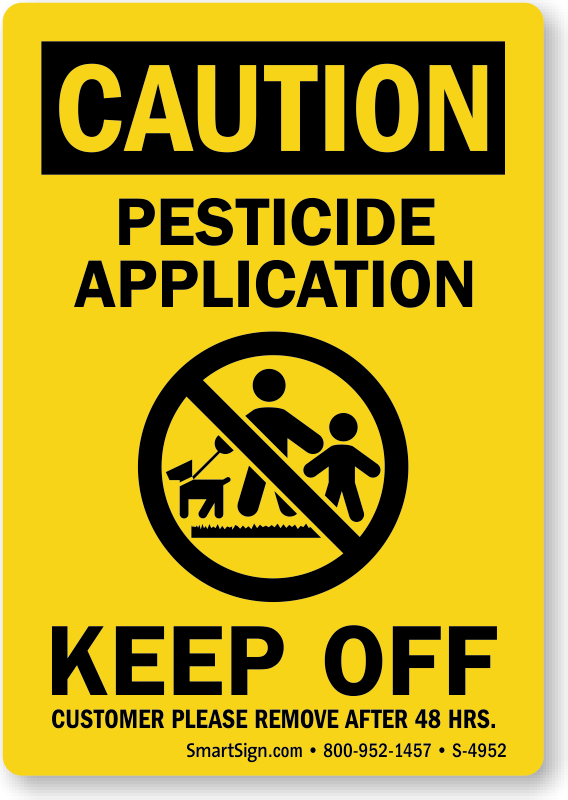Notice the yellow warning signs placed on a lawn after a professional lawn care treatment.
Ask your lawn care provider for a list of all chemicals put on your lawn during the entire year. Look the chemicals up on the Internet searching for effects on children and pets.

The commonly used lawn herbicides like 2-4-D and 2-4-5-T are essentially plant-growth hormones. They cause the plant to “grow itself to death.” That is why you see the dandelions turn upside down after being sprayed with 2-4-D or other similar chemicals. 2-4-D is one of the two main chemicals used in Agent Orange in Vietnam. Pets, children, and adults exposing bare skin (feet or hands) to lawns treated with chemicals risk dangerous side effects.
A professional dog trainer said that many people attribute cancer in dogs to exposure to lawn care chemicals. Your dog or cat could walk through lawn care chemicals and later lick its feet. The chemicals can be absorbed through the skin and be tracked into the house from a treated lawn. While treating lawns, the chemicals can be inadvertently sprayed onto sidewalks or relocated by rain. The fumes are also dangerous. Many of the chemicals are known to accumulate in the body and are known to cause cancer.
An internet search finds many articles on this subject:
https://www.petguide.com/blog/dog/study-canine-cancers-linked-to-common-lawn-chemicals
https://www.dogcancer.com/articles/causes-and-prevention/lawn-chemicals-herbicides-and-pesticides
Recommended reading:
ContamiNation: My Quest to Survive in a Toxic World by McKay Jenkins
Please help to make everyone aware of the potential dangers of lawn care chemicals and to take appropriate action to protect children, pets, and of course, adults.
A word about lawn weeds
The weeds are green are they not? They can also contribute to food for birds, rabbits, bees, etc. I like the dandelions’ yellow flowers and call them “Spring Mums”; they mostly bloom only for a few weeks in the spring. If you don’t like the dandelion flowers then just mow them. Clover not only produces food for wildlife, but the flowers also give a pleasant scent. Clover adds nitrogen to the soil that helps the grass thrive. In the past, clover seed was sometimes added to commercial grass seed. Other weeds have beneficial properties. Do we really need a perfect weed-free lawn?
How can I maintain a reasonably attractive lawn without using chemicals?
Healthy grass will tend to choke out or at least reduce the number of most weeds. In this part of the country, the soil is very likely to be acidic and most grass species do well in acidic soil. I apply a light dose of lime and lawn fertilizer every two or three years using a handheld spreader. Of course, increased fertilizing will probably result in increased mowing frequency. Keep the height of cut at least 2 ½ inches to give the grass a better chance to “smother” the weeds by reducing the sunlight going to the weeds. Watering in dry weather is good but there is no need to overdo it. Grass develops a very fibrous root system that also helps choke out the weeds.
Opt out of mosquito spraying
A few years ago, I went on a fishing trip to a wilderness area in central Ontario, Canada. It was so remote that we heard wolves howling at night and saw bears and northern lights. I took mosquito repellent but to my surprise, I did not need it. The lodge owner said that the area had never been sprayed and that he had cataloged over 40 different species of dragonflies. Some of the dragonflies were iridescent and very beautiful blue, red and green. SkinSoSoft is a very safe repellent that you can get from Avon.
Insecticides will kill predatory insects like Dragonflies that have mosquitoes as their primary food source. The Mosquitoes have a much shorter reproductive cycle than the predators and you will end up with more Mosquitoes than before. That is not to mention killing beneficial insects like honey bees and beautiful butterflies. Insect eating birds and bats are also vulnerable. Some of the insecticides are extremely deadly to humans and some are systemic on the plants and the nectar from the flowers of sprayed plants will kill bees.
